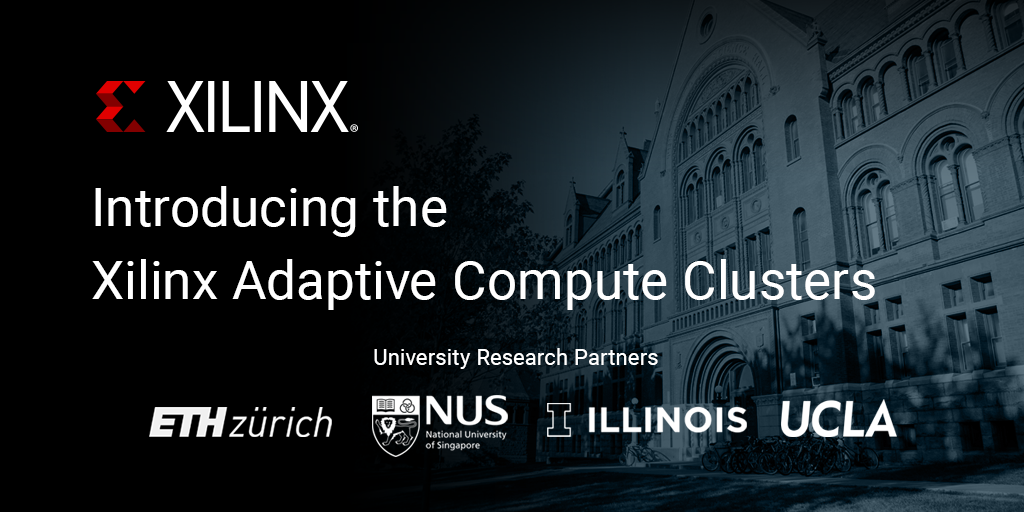A unique opportunity to explore the latest technology
05.05.2020 | Pauline Lüthi
ETH Zurich is one of four selected universities around the world to establish adaptive compute research clusters with teams from Xilinx, a company that develops highly flexible and adaptive processing platforms to enable rapid innovation across a variety of technologies.

external page Xilinx, Inc. is establishing Xilinx Adaptive Compute Clusters (XACC) at four of the world’s most prestigious universities, among them ETH Zurich. The XACCs provide critical infrastructure and funding to support novel research in adaptive compute acceleration for high performance computing (HPC). The scope of the research is broad and encompasses systems, architecture, tools and applications.
The clusters will be equipped with the latest Xilinx hardware and software technologies for adaptive compute acceleration. Each cluster is specially configured to enable some of the world’s foremost academic teams to conduct state-of-the-art HPC research.
Inaugural research at ETH Zurich
The first of the XACCs is installed at ETH Zurich, where the cluster will be led by Professor Gustavo Alonso, head of the Institute for Computing Platforms and member of the Systems Group at the Department of Computer Science. The Systems Group is an open research and teaching collaboration and hosts a wide variety of research projects, many in collaboration with industries.
Professor Alonso explains that the focus of the cluster will be on network and database acceleration. As Alonso’s recent research is related to multi-core architectures, large clusters, FPGAs, and big data mainly working on adapting traditional system software (OS, databases, networking) to modern hardware platforms, he is the ideal choice to lead this project.
"The cluster will enable new research and help establish a much-needed infrastructure for sharing designs, results, tools, and ideas in a reproducible manner."Gustavo Alonso
The XACCs are comprised of high-end servers, Xilinx Alveo accelerator cards and high-speed networking. In addition to 100Gps network connections between the compute nodes, each Alveo card has two connections to a 100Gbps network switch to allow exploration of arbitrary network topologies for distributed computing.
The high-end servers are equipped with the latest Xilinx software including Vitis, a unified software platform for software engineers, AI researchers and data scientists who want to exploit adaptive compute acceleration. All four XACCs are expected to be operational within the next three months. They will be expanded with the newest 7nm Versal Adaptive Compute Acceleration Platform (ACAP) in a future deployment.
Entering a new era
Professor Alonso highlights the unique opportunity and potential the XACC offers: “The cluster that Xilinx has made available to our researchers offers a unique opportunity to explore the latest technology at an unprecedented scale and ease of use.” The large donation of equipment, which is normally not readily available to most universities on this scale, is of great importance to Gustavo Alonso and other professors at ETH Zurich: “The cluster will enable new research and help establish a much-needed infrastructure for sharing designs, results, tools, and ideas in a reproducible manner”, Alonso elaborates.
"The XACCs will provide dedicated hubs for innovation and research collaboration that will drive the development and integration of new adaptive compute technology into next generation systems."Ivo Bolsens
external page Ivo Bolsens, CTO and senior vice president at Xilinx, talks well enthusiastically about the path to come: “With the decline of Moore’s law we are entering an exciting era where the next wave of computing systems will look very different to what we have seen in the past, and adaptive compute accelerators will play a key role. The XACCs will provide dedicated hubs for innovation and research collaboration that will drive the development and integration of new adaptive compute technology into next generation systems.”
XACCs as a community hub
The other three XACCs will follow at the University of California, Los Angeles (UCLA), led by Professor Jason Cong, Director for the external page Center for Customizable Domain-Specific Computing, the University of Illinois at Urbana Champagne (UIUC), led by Professor Deming Chen and Professor Wen-Mei Hwu, both with the external page ECE Department, and the National University of Singapore (NUS), led by Associate Professor Bingsheng He from the external page Department of Computer Science.
In the future more leading academics will be invited to join the programme. Partner research teams will be able to remotely access the clusters’ computing resources to carry out their own research in adaptive computing. The XACCs will act as a community hub for researchers to come together to collaborate with other experts in the field, including Xilinx in-house research groups.
Read the official press release external page here.
